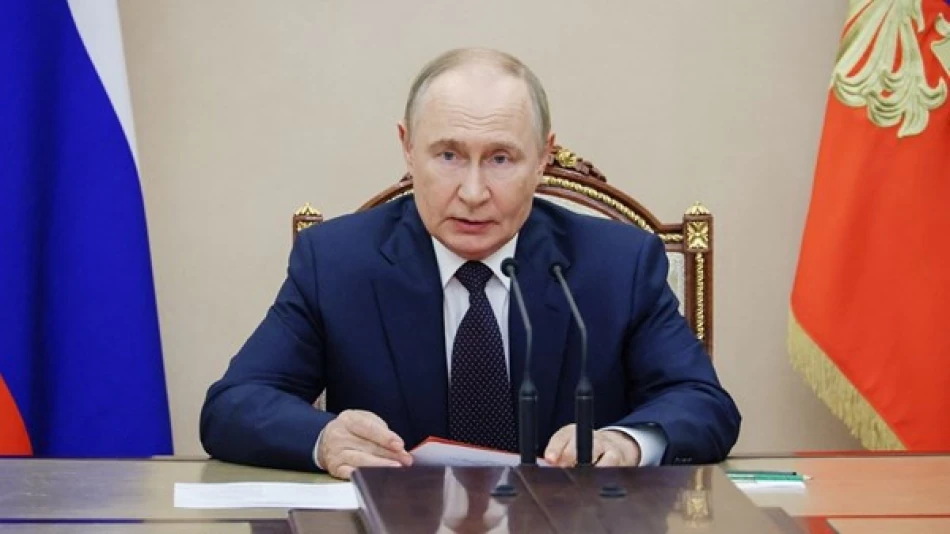
Putin Praises US Efforts to Resolve Ukraine Conflict
Putin Praises Trump Administration's "Sincere" Efforts to End Ukraine War Ahead of Potential Summit
Russian President Vladimir Putin expressed approval for what he called "sincere" American efforts to resolve the Ukraine conflict, marking a notable diplomatic shift as speculation mounts over a potential meeting with Donald Trump. The comments, delivered to senior Russian officials, signal Moscow's apparent readiness to engage with the new U.S. administration on ending the nearly three-year war.
A Strategic Pivot in Russian Rhetoric
Putin's characterization of American efforts as "active and sincere" represents a dramatic departure from the Kremlin's previous rhetoric toward Washington. Throughout the Biden administration, Russian officials consistently portrayed U.S. involvement as obstructionist, accusing America of prolonging the conflict by supplying weapons to Ukraine.
The timing of these remarks is significant. They come as Trump has repeatedly promised to end the Ukraine war "within 24 hours" of taking office, though without providing specific details on how such a rapid resolution would be achieved.
Reading Between Diplomatic Lines
Moscow's Calculated Messaging
Putin's praise appears carefully calibrated to create favorable conditions for potential negotiations. By publicly acknowledging American "sincerity," the Russian leader may be attempting to establish a foundation of mutual respect that could facilitate talks while simultaneously pressuring the Trump administration to deliver on its campaign promises.
This diplomatic overture also serves Putin's domestic audience, portraying Russia as the reasonable party willing to engage in dialogue while maintaining that Moscow's position remains strong.
Trump's Ukraine Dilemma
The incoming president faces a complex challenge in Ukraine that differs markedly from typical campaign rhetoric. Any settlement will require balancing competing demands: Ukraine's insistence on territorial integrity, European allies' security concerns, and Putin's likely demands for sanctions relief and recognition of territorial gains.
Trump's previous relationships with both Putin and Ukrainian President Volodymyr Zelensky add another layer of complexity. While Trump has praised Putin in the past, he has also provided military aid to Ukraine and maintained that his business acumen uniquely positions him to broker a deal.
Market and Geopolitical Implications
Financial markets have already begun pricing in potential Ukraine resolution scenarios. Energy stocks and Russian assets have shown increased volatility as investors weigh the possibility of sanctions relief against continued uncertainty. European defense contractors, meanwhile, face questions about future demand if American security guarantees shift.
The broader geopolitical implications extend beyond Ukraine. A Trump-Putin rapprochement could reshape NATO dynamics, influence China's calculations regarding Taiwan, and alter the global balance between democratic and authoritarian powers.
Historical Precedent and Realistic Expectations
Previous attempts at U.S.-Russia reset have yielded mixed results. The Obama administration's early engagement with Moscow ultimately foundered on disagreements over missile defense and human rights. Trump's first-term efforts were hampered by domestic political constraints and competing bureaucratic interests.
The current situation presents both opportunities and obstacles that didn't exist in previous diplomatic efforts. Russia's military has made territorial gains but faces economic pressure from sanctions and the costs of prolonged warfare. Ukraine, while receiving substantial Western support, confronts manpower shortages and war fatigue among some international partners.
Putin's latest comments suggest Moscow sees potential in engaging with Trump, but any sustainable agreement will require addressing fundamental questions about European security architecture, NATO expansion, and the principles governing territorial sovereignty in the 21st century.
Most Viewed News

 Layla Al Mansoori
Layla Al Mansoori






